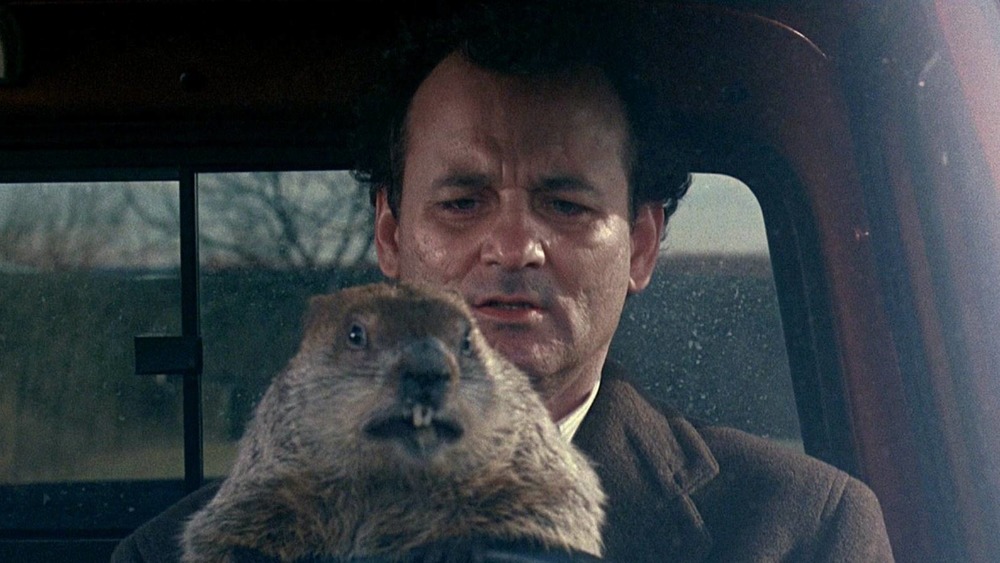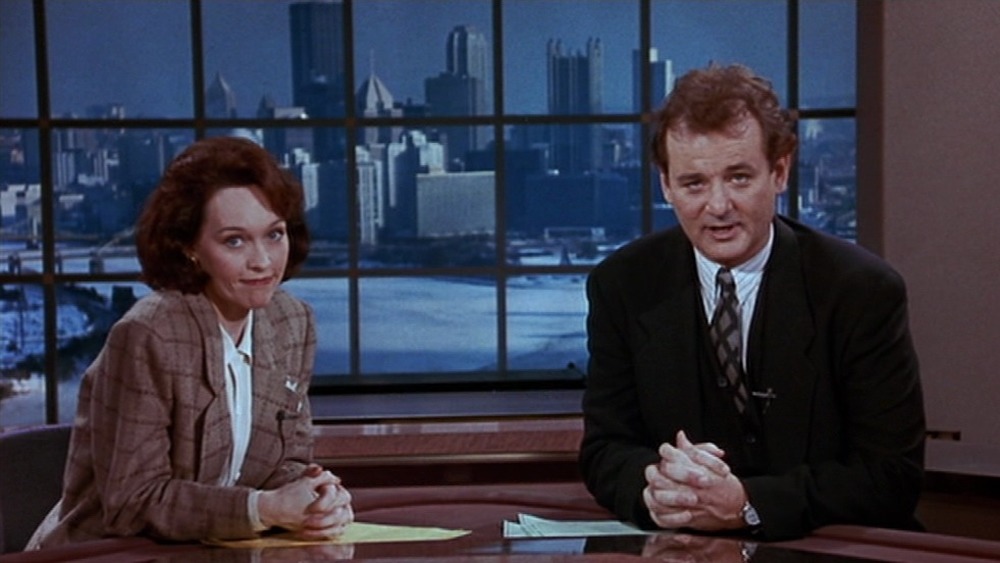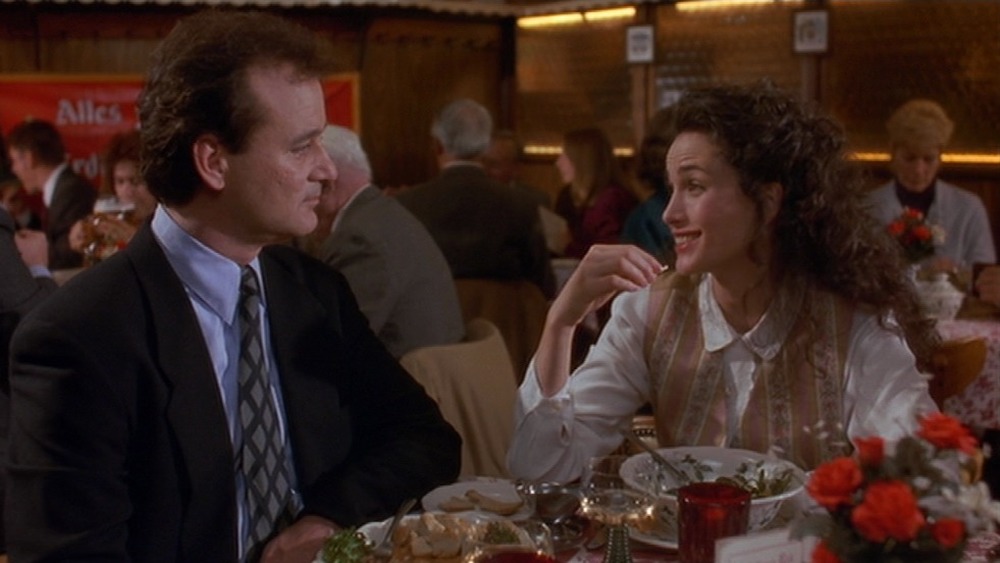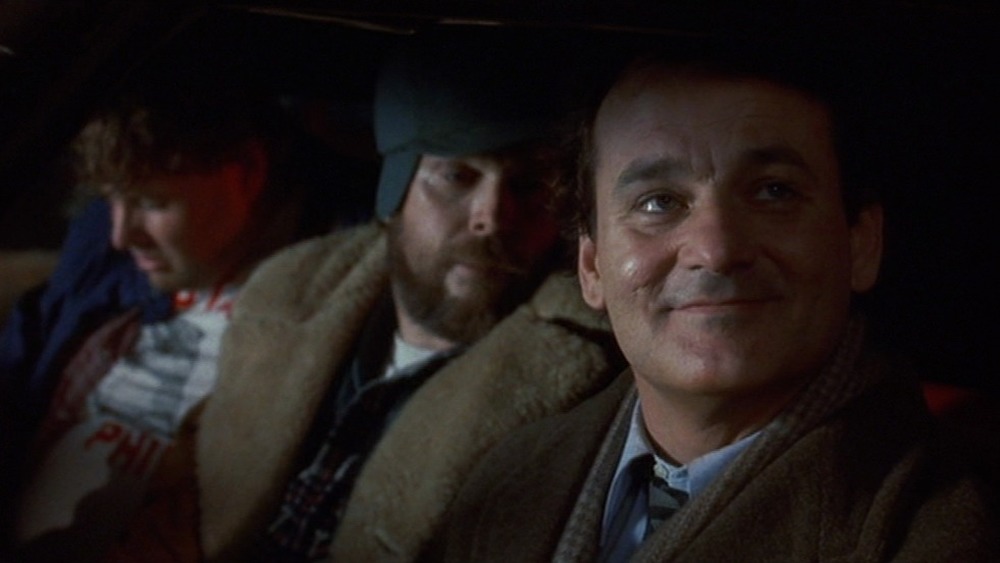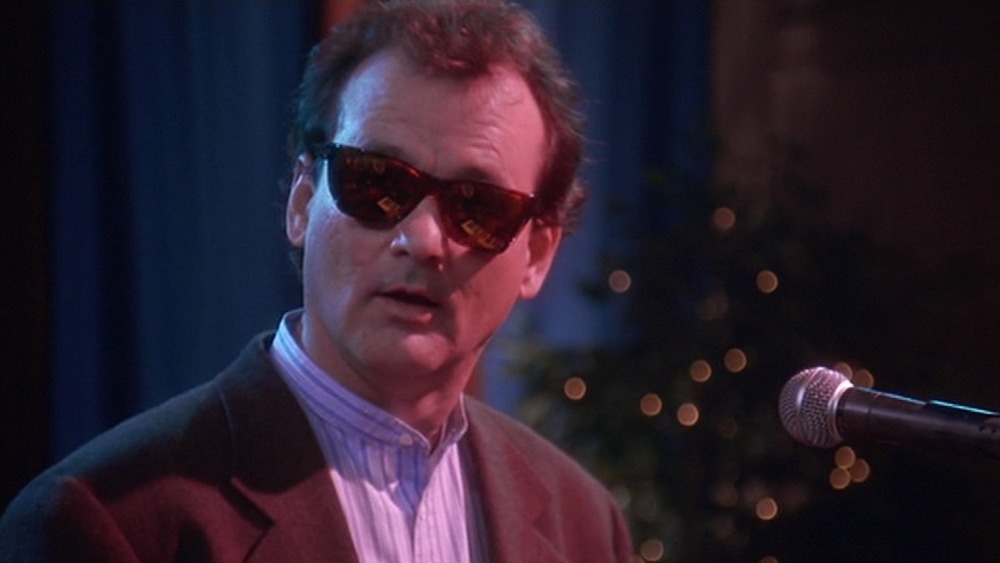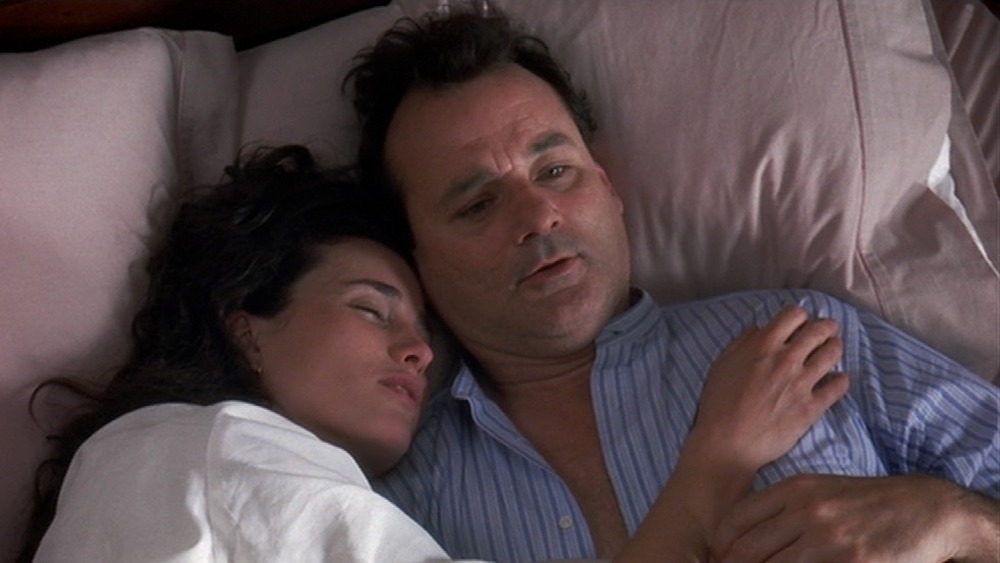The Real Reason Bill Murray Hated Groundhog Day
Not only is 1993's Groundhog Day considered one of Bill Murray's best films ever, but it's also widely regarded as one of the finest comedies to come out of the 1990s. It's the perfect blend of hilarious jokes and thoughtful commentary on the meaning of life — and even if you've never seen the film before, you've likely seen it referenced plenty of times when someone's describing the feeling of being trapped in a repetitive cycle. Groundhog Day has also influenced a number of movies released in the last three decades; the premise of a protagonist trapped in an infinite time loop has been used in flicks like Edge of Tomorrow, Happy Death Day, and Palm Springs.
Groundhog Day has pretty much become required viewing every time February 2 comes along, and it's even been preserved by the Library of Congress for its cultural significance. Everyone seems to love the movie ... except for Bill Murray.
One might assume Murray — who leads Groundhog Day as grumpy weatherman Phil Connors, who's stuck in a time loop and has to cover the Groundhog Day event in Punxsutawney, Pennsylvania over and over again – would have a soft spot for the film that helped showcase his talents as a dramatic actor as well as a comedic one. And wouldn't Murray love a movie that everyone loves him in? Unfortunately not. Murray doesn't exactly have kind words for the filmmaking experience, and once you see why, you may view Groundhog Day in an entirely different light.
Bill Murray's marriage was falling apart during the making of Groundhog Day
Groundhog Day is a film about a man who has to relive the worst day of his life over and over again. In the midst of filming for Groundhog Day, life imitated art in a sad way: Murray's marriage to his first wife, Margaret Kelly, started to come undone, and ultimately resulted in divorce in 1996. While his marriage was still on the rocks, the actor was reportedly unruly and difficult to work with — "really irrationally mean and unavailable," according to Groundhog Day director Harold Ramis (via The New Yorker).
In a 2012 interview with Entertainment Weekly, Ramis further described Murray's personality during this period of time, revealing that he was often irritable and wasn't easy to communicate with. "I learned to step back. You don't step in front of a train. You just let it go by," said Ramis.
The director also shared that Murray resented Groundhog Day on the whole, telling EW, "Bill had all these obvious resentments toward the production, so it was very hard for a time to communicate with him. Calls would go unreturned. Production assistants couldn't find him." It sounds as though Murray had a tough time separating his personal life from his professional one, making everyone's job all the more difficult.
Ramis went on to discuss Murray's handling of a suggestion that he get a personal assistant to take care of the minutiae of his work so he wouldn't have to focus on it himself. Things didn't pan out as expected. "He hired a personal assistant who was profoundly deaf, did not have oral speech, spoke only American sign language, which Bill did not speak, nor did anyone else in the production," Ramis explained. "But Bill said, 'Don't worry, I'm going to learn sign language.' And I think it was so inconvenient that in a couple weeks, he gave that up."
That stress was only the beginning of what would prove to be an incredibly contentious production.
Bill Murray went through a lot of unpleasant physical comedy throughout filming
The production of Groundhog Day didn't involve what you might expect from your average comedy. Murray didn't just show up on set and recite some funny lines; he went through a ton of physical comedy that resulted in him getting beat up pretty badly. That would make anyone feel irritated and exhausted, let alone someone who was already going through huge struggles outside of filming, and may have contributed to his sour mood.
During the 25-year anniversary of the movie's release, Murray's Groundhog Day co-star Andie MacDowell (who plays producer Rita Hanson) spoke to TheWrap about her experiences filming — including the fact she had to slap Murray numerous times during shooting. "He asked me to really slap him," the actress stated. "It's hard to hit someone that many times!"
That wasn't the end of it. There's a scene later in the film where Murray and MacDowell's characters get into a snowball fight with some kids. According to Joe.ie, Ramis instructed the youngsters to actually throw the clumps of snow as hard as possible, which probably wasn't too fun for Murray to film. Murray's never spoken publicly about whether all these scenes of intense physical comedy hurt him, but we can't imagine they were the most enjoyable moments to capture.
Bill Murray and Harold Ramis had creative differences about the tone and direction of Groundhog Day
Perhaps the most well-known issues that took place during the filming of Groundhog Day involved the strained relationship between Murray and Ramis. The pair worked together on some of the most popular comedies of the 1980s — including Caddyshack, Stripes, and Ghostbusters – but their relationship changed drastically when they collaborated for Groundhog Day.
As reported by Joe.ie, Murray wanted to lean into the darker, more philosophical moments of the plot in a bid to make the audience question what it means to live a fulfilling life. This seems to be in line with earlier drafts of the script written by Danny Rubin, who wanted the movie to begin with Phil Connors crashing his car before the audience even knows what's going on in terms of the repeating day (via Den of Geek). This was in contrast to Ramis' vision, who reportedly wanted more of a comedy focus.
What resulted was an even more tense dynamic on set. According to Uproxx, Murray threw tantrums when he and Ramis didn't see eye on eye on things, and even before arguments would happen, Murray would "generally disagree with many of Ramis' choices." In Ramis' own words, "What I'd want to say to him is just what we tell our children: 'You don't have to throw tantrums to get what you want. Just say what you want'" (via The New Yorker).
While the final product appears to perfectly balance the two extremes, with many viewing Groundhog Day through various religious lenses (via The New York Times), it caused a rift between the two talented individuals for several decades to come.
Bill Murray allegedly didn't want his career tied to Harold Ramis
Ramis wrote and/or directed many of Murray's early successes when his career was just starting out. It appears as though over a decade into their professional relationship, Murray developed the desire to break free of thinking he could only do well if he was speaking words Ramis wrote and acting under his direction. A 2004 article from The New Yorker expounded upon this, stating, "Some of the pair's friends believe that Murray resents how large a role Ramis had in creating the Murray persona." Prolific film producer Michael Shamberg was even quoted as saying, "Bill owes everything to Harold, and he probably has a thimbleful of gratitude."
While Ramis and Murray barely spoke to each other in the years following Groundhog Day, it didn't sound like Ramis held any anger toward the actor. In fact, he went on to say, "There are so many pride issues about reaching out. Bill would give you his kidney if you needed it, but he wouldn't necessarily return your phone calls."
Sadly, it took extreme circumstances to bring the two men back together.
Making amends and appreciating Groundhog Day in a different medium
In 2010, Ramis contracted autoimmune inflammatory vasculitis, causing him to lose the ability to walk and speak during the final few years of his life. Sadly, Ramis died on February 24, 2014 (via The Chicago Tribune). Shortly before Ramis' death, Murray went over to his house to make amends. An article from Vulture reports that Murray arrived at the director's house early in the morning with a police escort and some doughnuts. At that point in time, Ramis couldn't really talk, so Murray carried much of the conversation, with the pair laughing and reconciling throughout.
Less than a month after Ramis' death, Murray was a presenter at the 2014 Academy Awards. He was tasked with announcing the nominees and winner for Best Cinematography, but in a touching ad lib, he paid tribute to his departed friend. After listing all of the actual nominees, Murray said, "Oh, we forgot one: Harold Ramis for Caddyshack, Ghostbusters, and Groundhog Day." The audience broke into massive applause to commemorate the immense talent the world had just lost.
To the surprise of many, in 2017, Murray went to see the Broadway rendition of Groundhog Day — and he had nothing but great things to say about it. According to The New York Times, the actor was moved to tears at the stage play, and was seen "visibly sobbing" while watching it alongside his brother Brian Doyle-Murray and the movie's co- writer Rubin. "The idea that we just have to try again. We just have to try again," Murray said with a lump in his throat. "It's such a beautiful, powerful idea."
Murray may have hated Groundhog Day and the making of it, but he at least came to appreciate the heart of its story. Just don't go thinking Murray would appear in Groundhog Day 2 if it were to ever happen.
